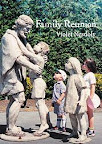(Part 1 of Chapter 8: "Into the Pit of My Stomach" - from Christ’s Witchdoctor - by Homer E. Dowdy ©1963)
[introduction]
part 1 ...
The conflict between Christ and Kworokyam worried Elka constantly. He was puzzled, too, that the teaching of God’s Paper, so disturbing in his life, had little effect on his people.
It seemed to have no impact; actually that was not quite true. Some who heard had their own version of the teaching. The sorcerer who had succeeded when Elka failed had come down from his home on the high mountain trail to one of the Sunday lessons and heard that a man should be the head of his house. He went back home and beat his wife; said he had God’s Paper to justify him.
Yukuma knew what to do with the teaching: talk much about Jesus to impress others. He talked but he did not waver from belief in the evil spirits. His second son, born of Tochi, was a child he wanted to have grow up. He carefully observed the taboos in order to preserve the boy’s spirit. He refused to eat with Elka, because Elka had once sat high up in a toucan hunter’s blind and Yukuma did not want the child’s spirit to be carried up into the tree only to fall to the ground and be crushed. He would not dig a posthole for fear his child’s spirit would fall into the hole and be covered with earth.
But one day Yukuma’s son became hot; he seemed about to die. Frantically Yukuma asked what he had done to make the child sick. Tochi reminded him that he had exerted himself in the child’s first days by helping to carry a heavy box for the missionaries. To make amends, Yukuma took a heated axhead into the shed where the box, containing a small generator, had been placed. Pouring cold water on the ax, he bathed the generator in a cloud of steam. Then to offer further apologies for breaking the taboos of foi he went to the airstrip, where he had done the carrying, and there steamed the field with cold water and hot rocks.
While he was gone his son died. Embittered on his return, Yukuma found no comfort in his old tribal beliefs, except to talk ill of Muyuwa, whose black magic he believed had killed his son. He found no comfort either in the Jesus whose name he so glibly spoke.
Others attended the lessons at which God’s Paper was taught. They also learned to read the portions already translated. Yet what they encountered seemed merely to entertain. There was no reflection in their lives of the Paper’s message. Maybe Elka was not wrong when he said the teaching seemed to have no effect on them.
His friend Kirifaka, an orphan, had sampled Christian doctrine and practice by living with the missionaries. One day he peeled off the clothes they gave him, put on his loincloth again, and went back to Deep Eddy, apparently willing to turn his back on all that they had taught him.
Elka’s brother Yakuta, now handsome as a copper statue, was given a girl his own age for a wife. She failed to satisfy him; older women attracted Yakuta. He took first one man’s wife, then another’s; he believed in sharing. In payment for meat from a hunter, he once loaned his current woman.
Yakuta and Kirifaka were among the quickest readers. They sang songs about Jesus. They knew many stories from God’s Paper. But what did it all mean to them?
Yoshwi was a one-eyed woman whose sight Tochi boasted she had nearly destroyed by a spell. Yoshwi’s tongue was as biting as her foe’s. She heard that God said not to kill. But she vowed if her next child was a boy–she had many boys–she would kill him.
A number of others now threatened killings and violence. Men said they would kill to get wives. Among them was Mawasha, Elka’s friend of many years. He was muscular and taller now than any in the tribe, yet shy and gentle. His thick hair was like a black halo. Likeable, quiet, unemotional Mawasha refused to let God’s Paper deter him in announcing that he would kill, if necessary, to take another man’s wife.
(Next, is a longish account of a late-teens youth, Rikaru, who works for the missionaries, Achi [a lady missionary nurse], Bahm and his wife Ferochi. When a young woman refuses to give Rikaru a string of beads, he follows her, her daughter-in-law and the DIL’s three children into the forest, and bludgeons all five of them to death in their sleep. Then he comes back to the Kanashen, where he steals another man’s wife.
When the bodies of the people he’d murdered are found, he escapes. It’s only through the efforts of missionary wife Ferochi that he is captured and flown to a Georgetown jail.)
Rikaru was the first Wai Wai killer to face the white man’s judgement. Elka was more concerned with God’s judgement of badness; not just murder, but greed and gluttony, malice and hate, including his own. He had tried to be a good witchdoctor. But what had he done for his people? Were they better off than they had been before the spirits of the forest were blown into his nostrils? They were better off, he reasoned. But were they better off for his blowing or, as Bahm and Kron had said, for God’s breath of blessing?
Christ or Kworokyam? He wondered...
on to part 2...
Tuesday, April 12, 2005
faith stories: elka of the wai wai -part 1
Posted by
Violet N.
at
6:15 AM
![]()
![]()
Labels: life-changing stories
Subscribe to:
Post Comments (Atom)

0 comments:
Post a Comment